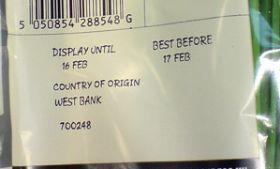
A new law banning the sale of products cultivated in illegal Israeli settlements was recently signed by Palestinian president Mahmoud Abbas, with violators facing up to five years in prison, according to the Associated Press.
The law also bans Palestinians from working on these settlements, but, according to economics minister Hassan Abu Libdeh, this will not be immediately enforced due to high unemployment.
Some 25,000 Palestinians currently work in settlements, but their expansion is seen as a major barrier to the creation of a viable future state.
In the UK, anti-poverty charity War on Want has accused UK supermarket chain Waitrose of misleading its customers after the retailer claimed to have ceased stocking goods from illegal Israeli settlements.
According to War on Want’s own investigation, Waitrose continues to sell goods produced in the settlements.
The charity’s executive director, John Hilary, said in a statement: “Waitrose should live up to its ethical claims and stop stocking any goods from illegal Israeli settlements or it will continue to face protests.”
Following the issuance of new guidelines by the UK government, both Tesco and Sainsbury’s now label products as either ‘West Bank (Israeli settlement produce)’ or ‘West Bank (Palestinian produce)’, insisting that the choice is up to the customer.
Meanwhile, KF, the Swedish Co-operative Union that runs a fifth of Sweden’s grocery retail sector, is one step closer to boycotting Israeli products.
During a meeting of the Western section of KF in Gothenburg last week, a majority of the members voted in favour of a boycott, according to a number of reports.
The Jerusalem Post quoted KF West head Carina Malmer: “The board of the section will now try to convince the other Swedish sections of implementing a nationwide ban on Israeli products in all the Coop supermarkets.”



